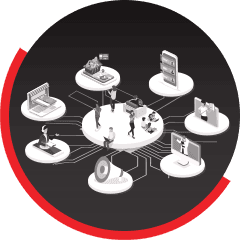Multi-channel marketing offers several advantages to retailers, advantages that make it a worthwhile investment. The pandemic (we can’t call it a post-pandemic era just yet) has made it clear that e-commerce is an essential element of any retail strategy, one which needs to be supported by activities on social media platforms and a consistent, coherent digital marketing strategy.
For retailers, its no longer a question of running a physical store – or even a chain, with an option for customers to buy online. In fact, that’s the bare minimum.
The transformation in retail has been so marked that even small neighbourhood stores are finding ways to serve their customers online. In June 2020, The Washington Post reported that “restaurants closed dining areas and scraped by on pickup and delivery ordered via apps. Small shops that sell physical goods such as clothes and books figured out ways to list products online and in some cases created websites for the first time. Stores that still sell from physical locations are changing how they get paid — moving away from riskier cash and even physical credit card payment systems to prepaid invoices and contactless options.” In Latin America, small retailers moved to WhatsApp, Facebook and Instagram to sell their goods. In India, even the roadside and-cigarette stores tied up with delivery service companies to sell their goods.
The future is Omni-Channel
Recent market research suggests that the customer these days are looking at multiple touchpoints before confirming a purchase.
- 74% of buyers bought at retail stores
- 44% at different web stores
- 54% at e-commerce marketplaces
- 36% at “other” locations
The data indicates that purchase at physical locations still remains important, but is increasingly supplemented by digital shopping.
What are Multi-Channel and Omni Channel Retail?
Multichannel is when a company uses several channels to communicate the same message or idea to customers. The company’s message is sent out via social media communications, personalized ads on Google, email campaigns and retail store displays.
Omni channel outreach is much more customer-centric. The channels that the customer uses to engage with the brand not only have a unified message, but that message adapts to each touchpoint a customer has with the brand.
5 Advantages of going Omni Channel
- Greater Consumer Satisfaction: Giving a consistent but wide range of choices to the customer allows them to use the channel they are most comfortable with. Consistency also gives the seller a distinct identity, one that facilitates quick and easy recognition – which can translate into customer confidence.
- Better Conversion: When products are made visible to prospective customers through a variety of channels, there is a greater possibility of an actual purchase.
- Faster revenue impact: This is a natural fallout of 1 and 2 - Increased Return on Investment is the key metric in any endeavour. With accurate segmentation and personalization, an omnichannel marketing strategy can be very successful. Higher customer engagement will lead to more conversions and higher ROI.
- Better Operational Efficiency: There are other benefits that an omnichannel strategy brings. Since all touchpoints are built around the customer – redundancies decline. A Forbes study has noted that retailers using omnichannel can reduce cost of service by as much as 15%.
- High Quality Data: In a nutshell, multichannel marketing tends to splinter into silos where data and journeys are kept on the dedicated channel, omnichannel is built around transparency, and therefore customer data and journeys are synchronized across all channels – leading to better quality customer data
Sonata’s ready Digital retail industry platform Brick & click integrated with your dynamics ERP to manage omni-channel needs
Retailers that need an omni channel system – one that integrates the shopper’s experience across every touchpoint - online & offline, payment & invoices and logistics and shipping - will be well served to implement an ERP integrated solution end to end. Sonata’s ERP integrated Brick & Click solution provides a seamless flow of data that covers customer on boarding, orders, inventory, shipments, and payments.

